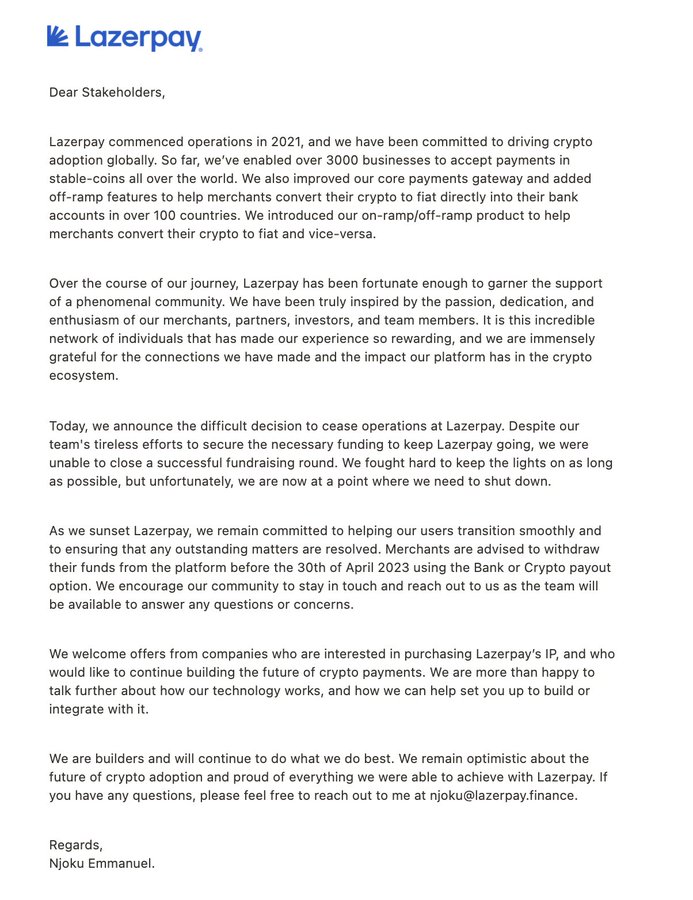Lazerpay shuts down after inability to raise funding
Nigerian crypto and web3 company, Lazerpay has shut down its operations, following its inability to raise additional funding.

Following its inability to raise additional funding, Nigerian crypto and web3 company, Lazerpay has shut down its operations. Last November, the company laid off some of its employees after the proposed lead investor for its seed round withdrew its interest due to the "market conditions and disagreement on terms".
"Despite our team's tireless efforts to secure the necessary funding to keep Lazerpay going, we were unable to close a successful fundraising round," Njoku Emmanuel, founder and CEO of Lazerpay said in a statement seen by Benjamindada.com. "We fought hard to keep the lights on as long as possible, unfortunately, we are now at a point where we need to shut down."
Launched in 2021, Lazerpay worked like Stripe, but for crypto. Businesses used its channels to accept crypto payments from their customers: integrate a collections widget in their apps and collect payments through a link.
"What we are doing is helping Africans accept payments in crypto, but we have plans for much more. We want to drive financial inclusion and interoperability in Africa. We are building a gateway where Africans will be able to send and receive crypto using their local currencies," Njoku said in a previous interview.
"For example, a Kenyan buyer can send Ksh to a Ghanaian seller, but the seller receives USDT instead of cedis, all without going to the bank or speaking to a middleman. People will be able to send USDT through their local currencies, and Lazerpay's role will be converting the local currency to crypto—USDT—so everyone can hold the real value of their monies," he added.
Since its launch, the company claimed that it has enabled over 3000 businesses globally. Lazerpay has also enabled merchants across more than 100 countries to convert crypto into fiat currency and vice versa.
According to Njoku, all Lazerpay merchants should withdraw their funds from the platform on or before April 30 using the bank or crypto payout options. "We remain committed to helping our users transition smoothly and to ensuring that any outstanding matters are resolved," he added. Also, the company disclosed that its IP is available for sale.

The aftermath of FTX collapse
Although Lazerpay said it was not impacted by the FTX collapse last year, its lead investor, Nestcoin downsized an undisclosed number of its workforce as part of efforts to cushion the effects of the FTX collapse on the company.
At the time, Yele Bademosi, Nestcoin's co-founder and CEO said the company used FTX to save a "significant proportion of the stablecoin investment" it raised from Alameda Research, FTX investment vertical—one of the investors in its $6.45 million pre-seed round with less than 1% equity in Nestcoin.
"While this is a challenging time for us and the industry as a whole—we see this as a wake-up call to focus on building a more decentralised crypto future where no one organisation or person can amass enough power to influence a nascent industry that has the potential to do good," Bademosi added.
Last month, Nestcoin announced that it is evolving its approach to maintain focus on building Onboard, a new product which it describes as a "digital finance platform that prioritises community and is owned by its members." Nestcoin’s leadership says its new mission is to “make modern finance borderless, trustless, and delightful".






